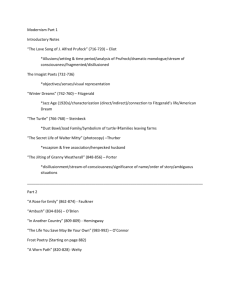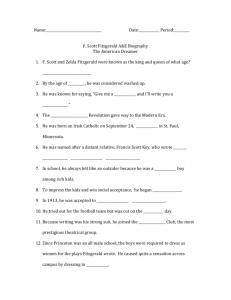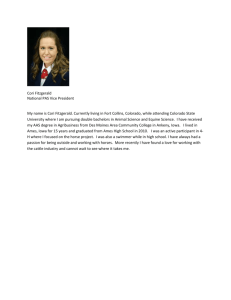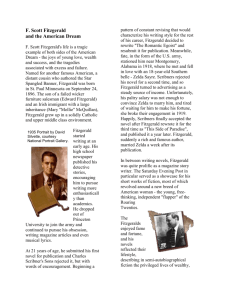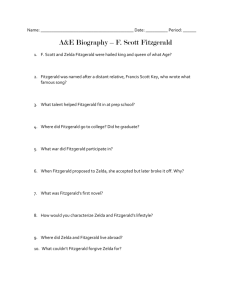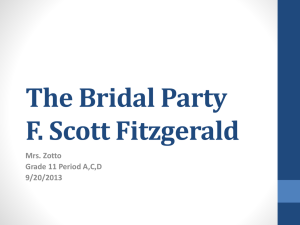Fitzgerald Background - MsCraig
advertisement
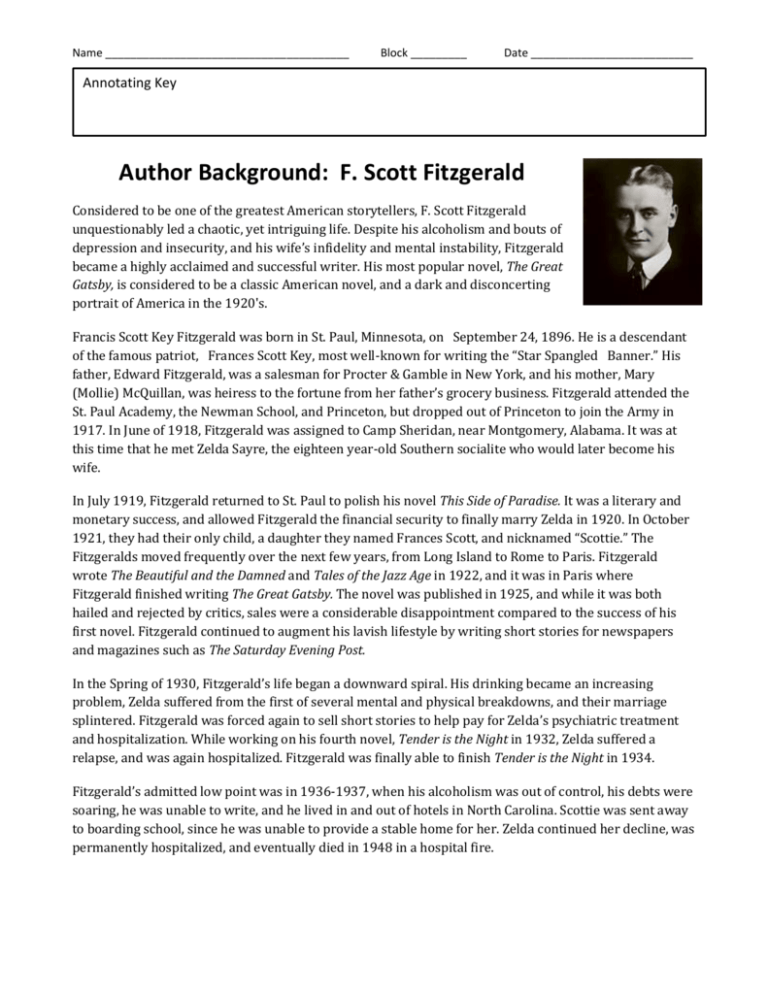
Name _______________________________________ Block _________ Date __________________________ Annotating Key Author Background: F. Scott Fitzgerald Considered to be one of the greatest American storytellers, F. Scott Fitzgerald unquestionably led a chaotic, yet intriguing life. Despite his alcoholism and bouts of depression and insecurity, and his wife’s infidelity and mental instability, Fitzgerald became a highly acclaimed and successful writer. His most popular novel, The Great Gatsby, is considered to be a classic American novel, and a dark and disconcerting portrait of America in the 1920's. Francis Scott Key Fitzgerald was born in St. Paul, Minnesota, on September 24, 1896. He is a descendant of the famous patriot, Frances Scott Key, most well-known for writing the “Star Spangled Banner.” His father, Edward Fitzgerald, was a salesman for Procter & Gamble in New York, and his mother, Mary (Mollie) McQuillan, was heiress to the fortune from her father’s grocery business. Fitzgerald attended the St. Paul Academy, the Newman School, and Princeton, but dropped out of Princeton to join the Army in 1917. In June of 1918, Fitzgerald was assigned to Camp Sheridan, near Montgomery, Alabama. It was at this time that he met Zelda Sayre, the eighteen year-old Southern socialite who would later become his wife. In July 1919, Fitzgerald returned to St. Paul to polish his novel This Side of Paradise. It was a literary and monetary success, and allowed Fitzgerald the financial security to finally marry Zelda in 1920. In October 1921, they had their only child, a daughter they named Frances Scott, and nicknamed “Scottie.” The Fitzgeralds moved frequently over the next few years, from Long Island to Rome to Paris. Fitzgerald wrote The Beautiful and the Damned and Tales of the Jazz Age in 1922, and it was in Paris where Fitzgerald finished writing The Great Gatsby. The novel was published in 1925, and while it was both hailed and rejected by critics, sales were a considerable disappointment compared to the success of his first novel. Fitzgerald continued to augment his lavish lifestyle by writing short stories for newspapers and magazines such as The Saturday Evening Post. In the Spring of 1930, Fitzgerald’s life began a downward spiral. His drinking became an increasing problem, Zelda suffered from the first of several mental and physical breakdowns, and their marriage splintered. Fitzgerald was forced again to sell short stories to help pay for Zelda’s psychiatric treatment and hospitalization. While working on his fourth novel, Tender is the Night in 1932, Zelda suffered a relapse, and was again hospitalized. Fitzgerald was finally able to finish Tender is the Night in 1934. Fitzgerald’s admitted low point was in 1936-1937, when his alcoholism was out of control, his debts were soaring, he was unable to write, and he lived in and out of hotels in North Carolina. Scottie was sent away to boarding school, since he was unable to provide a stable home for her. Zelda continued her decline, was permanently hospitalized, and eventually died in 1948 in a hospital fire. Fitzgerald moved to California in 1937 and worked for major Hollywood studios writing movie scripts. While working on his final novel, The Last Tycoon, Fitzgerald suffered a heart attack and died December 21, 1940 at the age of 44. The Last Tycoon was published posthumously in 1941. Reading Questions 1. When and where was F. Scott Fitzgerald born? 2. After what famous person was he named? What was this person known for? 3. What kind of school experience did Fitzgerald have? 4. Explain why the author of this article considered Fitzgerald’s life to be “chaotic.” 5. List the names and dates of publication of Fitzgerald’s major works. 6. Describe Zelda Fitzgerald. 7. About what kinds of characters and situations can you conclude Fitzgerald wrote? Explain your response. 8. What would you imagine happened to Fitzgerald’s daughter Scottie? Explain. 9. From the information given in the article, what conclusion could be drawn about American society during Fitzgerald’s time? ________ A. Americans were motivated and philosophical. B. Americans were interested in art and science. C. Americans were very religious and devoted. D. Americans were restless and reckless. 10. Using the information in the article, create a timeline of 5-7 important dates and events in Fitzgerald’s life.
